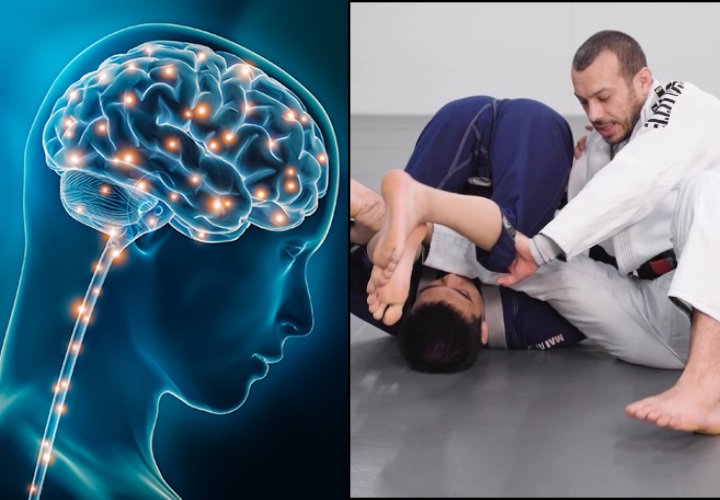Neuroscience is the scientific study of the nervous system, particularly focusing on the brain and its impact on behavior and cognitive functions. It encompasses a wide range of topics from the molecular biology of neurons to the complex interplay of neural networks in producing behaviors and mental processes. When applied to Jiu-Jitsu, neuroscience becomes a crucial tool in understanding and enhancing both learning and performance.
- Understanding Stress Response: Jiu-Jitsu often involves high-pressure situations which can trigger the body’s fight-or-flight response. Neuroscience helps in understanding how the brain reacts under stress, allowing practitioners and instructors to develop strategies to manage anxiety, improve focus, and maintain calmness during competition or self-defense scenarios.
- Motor Skill Learning and Memory: Jiu-Jitsu is a skill-intensive sport requiring precise movements and techniques. Neuroscience sheds light on how the brain learns and stores motor skills. This understanding can lead to more effective training methods, where movements become more automatic and require less conscious effort over time.
- Neuroplasticity: This is the brain’s ability to change and adapt as a result of experience. Consistent training in Jiu-Jitsu can lead to changes in the brain that help in improving reaction times, decision-making speed, and adaptability in various situations. This concept is vital for developing proficiency in martial arts.
- Focus and Attention: Neuroscience helps in understanding how to train the brain to improve focus and attention. This is crucial in Jiu-Jitsu, where being aware and attentive to an opponent’s movements is key to effective defense and offense.
- Pain and Injury Management: Understanding the neuroscience of pain can aid in better handling and recovery from injuries common in martial arts. It also contributes to developing pain tolerance and managing discomfort during training and competition.
- Mental Rehearsal and Visualization: Studies in neuroscience have shown that mental practice, such as visualization, can be almost as effective as physical practice. Visualizing techniques and strategies in Jiu-Jitsu can enhance muscle memory and performance.
- Emotion Regulation: The study of the emotional brain can aid practitioners in managing emotions like fear, frustration, or aggression, which are often part of competitive sports like Jiu-Jitsu.
- Enhanced Learning Methods: Based on neuroscience principles, training routines can be structured to optimize learning and retention of techniques, including varied and spaced practice sessions, interleaving different skills, and using feedback effectively.
Brothers Pedro, Gui, and Joaquim Valente offer a profound exploration into how neuroscience is fundamentally entwined with self-defense training, particularly in the realm of Jiu-Jitsu. The video, titled “Neuroscience and Jiu-Jitsu,” delves into the argument that a thorough understanding of neuroscience is crucial for every self-defense instructor. This perspective sheds light on how brain functions and response mechanisms are integral to learning and excelling, especially under high-stress conditions.
The Valente Brothers’ video presents a unique and insightful perspective on the crucial role of neuroscience in Jiu-Jitsu and self-defense training. It’s a thought-provoking watch for anyone interested in martial arts, cognitive science, or the teaching and learning of self-defense techniques, driving home the point that understanding our brain’s workings is key to mastering the art of self-defense.

















